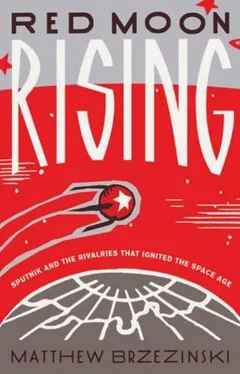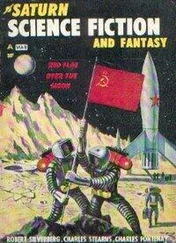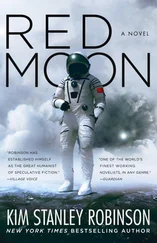Korolev “led us to a stand occupying a modest place in the corner,” Sergei Khrushchev recalled. “A model of some kind of apparatus lay on the stand. It looked unusual, to put it mildly. A flying machine should have a smooth surface, flowing shapes and clean-cut angles. But this one had some type of rods protruding on all sides and paneling swollen by projections.”
What is it? the Presidium members asked. A satellite, said Korolev. He paused for effect, gauging his guests’ reaction. There was none. Instead, they stared blankly at the meaningless object. Korolev must have sensed the disinterest, for he launched into an impassioned speech. From time immemorial, he said, growing animated and uncharacteristically emotional, man has dreamed of escaping the bonds of gravity, of breaking free of the earth’s atmosphere and exploring the cosmos. Until now the dream of the space pioneers—and here Korolev spoke glowingly of the nineteenth-century Russian rocket visionary Konstantin Tsiolkowsky—had belonged to the realm of theory or science fiction because no man-made object could generate sufficient velocity to break the gravity barrier. The R-7, though, was almost fast enough. With a little tinkering and a few minor adjustments, it could make that age-old dream possible.
Once again, Korolev paused and looked at his guests. The Presidium members seemed unmoved. So what? their expressionless faces seemed to say. What did any of this have to do with the development of an intercontinental ballistic missile that could keep the Soviet Union safe from American attack? How could the two even compare in national importance? Korolev was wasting their time with this romantic nonsense. The Chief Designer had been getting this sort of blasé reaction for two years now, ever since his proposal for a satellite project had begun wending its way slowly up the Soviet bureaucracy from one skeptical committee to the next. Decrees had been signed advocating the “artificial moon” as far back as May 1954, but without a champion on the Presidium to lend weight to the resolutions they were just pieces of paper. “You needed the constant support of power,” Sergei Khrushchev explained of the way things worked in the dictatorship of the proletariat. “Everyone needed to know that you could pick up the phone and dial the First Secretary’s four-digit extension number directly if there was an obstacle. Otherwise you would fail.”
Korolev must have sensed that he was losing his audience, and his one chance to get Khrushchev or one of the others to personally sign off on his pet project. He quickly changed tack. The Americans, he said casually, were in the advanced stages of developing a similar satellite. This was a slight exaggeration, but the Presidium didn’t need to know that. The United States, Korolev continued his pitch, had been working on a satellite for some years. He was certain, though, that he could beat them to space. It would be a significant scientific victory, he added, not to mention a serious defeat for the capitalists. Bulganin and Molotov looked at the model satellite with renewed interest. The shadow of a smile formed under Kaganovich’s dark mustache.
Korolev’s ploy had not been subtle, but it had its desired effect. He decided to press his advantage: “The Americans have taken a wrong turn. They are developing a special rocket and spending millions. We only have to remove the thermonuclear warhead and put a satellite in its place. And that’s all.”
Sergei Khrushchev recalled his father staring long and hard at the satellite model, mulling over Korolev’s request. “It seemed as if he was still debating the matter,” he observed. Part of the problem was that other than the prestige of being first in orbit, the satellite didn’t appear to have much of a purpose. Korolev had spoken of scientific readings and radio signals, but the men of the Presidium failed to see the point. They were not alone. Only a few hundred people on the entire planet in 1956 grasped the true potential and significance of a satellite, and several of them happened to work in surveillance at the CIA. For the leaders of the Soviet Union, dreams of distant space conquests risked becoming costly distractions from the immediate and earthly concerns of the cold war.
Minutes passed, and Korolev once again assured his masters that launching a satellite would in no way interfere with the development of the ICBM since it could only occur once the R-7 was fully operational anyway. Khrushchev seemed to weigh this. The ICBM was unquestionably the Soviet Union’s overriding priority. But the prospect of thumbing his nose at the arrogant Americans also had a certain undeniable appeal.
Okay, he finally relented. “If the main task doesn’t suffer, do it.”
Five thousand miles from Moscow—beyond bomber range—the Alabama sky brimmed a slate blue. To the west rose the Appalachian foothills, rolling like a brown carpet of dead leaves. The Tennessee River ran south, also brown and undulating, a giant corn snake weaving through the fallow cotton fields. To the east stood Huntsville, ancient Confederate battleground and the new home of the U.S. Army Ballistic Missile Agency.
The plane was coming in from the north, from Washington, whence the money and decisions flowed. Major General John Bruce Medaris stood on the tarmac, scanning the wintry horizon, searching for the contrail that would announce the impending arrival of the secretary of defense. Pacing at the edge of the runway, Medaris flicked his riding crop impatiently. A memento from his days serving with General George S. Patton, the swagger stick, along with his slender mustache, hazel eyes, and vaguely piratical air, lent Medaris a remarkable resemblance to Errol Flynn. This he knew, for he was vain, and his vanity, with its attending indiscretions, had already cost him one marriage—and very nearly another.
Dashing was the term the newspapers used to describe him. Belligerent, abrasive, and “a troublemaker who was hard to handle” were a few of the other, less flattering descriptions of Medaris, who would bluntly reply that “politeness is nice but takes too damn much time.” There was no middle ground with the fifty-three-year-old general. “You either loved him or hated his guts,” in the words of one subordinate. Those who served under Medaris tended to fall into the former category. Those he answered to in the Pentagon were usually in the latter.
And now they were coming on an inspection tour, these politicians and pencil pushers who were the perennial scourge of field officers. As a career Ordnance man, Medaris did not storm beaches, but he supplied the munitions for those who did. During World War II, he had moved thirty thousand vehicles for General Patton in the North African and Sicilian campaigns, and he had equipped General Omar Bradley’s entire First Army Group for the D-Day invasion. These were impressive logistical feats, but not the stuff of glory that made the newsreels. Still, Medaris managed to win a medal for bravery at Omaha Beach, in addition to numerous other combat citations and awards, and in spirit he identified more with the hard-charging fighting men of old than with the cautious new breed of technocrats taking over the military. Unfortunately for his career, this shared affinity included a disdain for authority and an enduring allergy to regulations.
It wasn’t that Medaris didn’t respect rules. But like Douglas MacArthur and Patton, he simply didn’t think they applied to him, as the Huntsville military police had discovered a few weeks earlier when he roared into his new command in a Jaguar and dressed in golf attire. “Didn’t you see the speed limit sign back there?” the startled MPs demanded.
“What did it say?”
“Forty-five miles an hour and you were going sixty.”
Читать дальше












